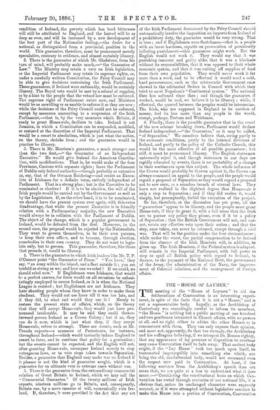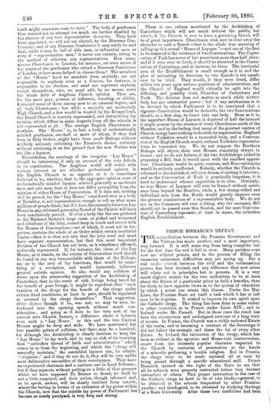THE "HOUSE OF LAYMEN."
THE meeting of the "House of Laymen" to aid the deliberations of Convocation is an interesting experi- ment, in spite of the facts that it is not a "House," and is not a representative body. Legally, as the Archbishop of Canterbury was exceedingly careful to inform its members, "the House" is nothing but a public meeting of one hundred and two gentlemen interested in Church affairs, with no powers at all, and no right either to advise the other Houses or to remonstrate with them. They can only express their opinion, and must not, apparently, do that to strongly, the Archbishop and his suffragans believing, if we interpret Dr. Benson rightly, that any appearance of lay pressure or disposition to overbear may cause Convocation itself to fade away. That ancient body might, if the "Lay House" took too much upon itself, be transmuted imperceptibly into something else which, not being the old, unadulterated body, would not command even the respect now paid to Convocation. At least, if the following sentence from the Archbishop's speech does not mean that, we are quite at a loss to understand what it does mean :—" Considering the constitutional basis on which Con- vocation has rested through centuries of our natioual life, it is obvious that, unless its unchanged character were expressly secured, or if it were attempted withoot legislative sanction to make this Howe into a portion of Convocation, Convocation
itself might unawares cease to exist." The body of gentlemen thus warned not to attempt too much, are further disabled by the absence of any true representative character. They have been appointed, we will not say elected, by the Diocesan con- ferences; and of any Diocesan Conference it may safely be said that, while it may be full of able men, or influential men, or even of "representative men," it never can contain, owing to the method of selection, any representatives. How many sincere Churchmen in London, for instance, are even aware of the names of the gentlemen who attend a Diocesan Conference of London, or how many helped to choose them ? The members of the " House " have no mandate from anybody, are not responsible to anybody even as a Caucus, for instance, is responsible to its electors, and need not represent anybody except themselves, who, we must add, by no means cover the whole field of Anglican Church opinion. They are, for the most part, persons of influence, standing, or ability, honoured some of them among men to an unusual degree, and all truly Churchmen ; but while a majority are moderately High Church, and a few would be trusted by the Evangelicals, the Broad Church is scarcely represented, and distinctively lay opinion, which differs in some respects from all the schools, is not represented at all. The average English Churchman is nowhere. The " House " is, in fact, a body of ecclesiastically -minded gentlemen, one-half or more of whom, if they had been in Holy Orders, might have been made Bishops without -anybody seriously criticising the Premier's choice, certainly without criticising it on the ground that the new Prelate was too like a layman. Nevertheless, the meetings of the irregular "Lay House" should be interesting, if only on account of the very defects in its constitution. The Anglican world will watch with curious interest to see whether professional opinion in the English Church is as separate as it is sometimes believed to be, whether, that is, the aggregate opinion even of • ecclesiastically minded laymen selected generally as moderate =en and safe men, does or does not differ perceptibly from the opinion of either House of Convocation. If it does not, nothing will be proved, for the "Lay House," considered even as a body -of Notables, is not representative enough to tell us what some millions of people think; but if it does, the necessity for a true Lay House in any reformed governing Synod of the Church will have been conclusively proved. If even a body like the one gathered in the National Society's large room, so picked and winnowed and sifted out of the laity, cannot keep in touch and accord with the Houses of Convocation—one of which, it must not be for- gotten, contains the whole of an Order within certain territorial limits—then it is clear not only that the laity need and must have separate representation, but that this most important division of the Church has not been, as is sometimes affirmed, indirectly represented. If, for instance, the ideas of the Lay House, as it stands, on the reform of Convocation itself should be found in any way irreconcilable with those of the Bishops, say as to the area of lay functions, that would be some- thing of a revelation, and would immensely influence general outside opinion. So also would any collision of views upon the noteworthy suggestion of the Archbishop of Canterbury that in the event of rich livings being taxed for the benefit of poor livings, it might be expedient that "such taxation of the clergy for the benefit of the clergy under certain fixed conditions, at least in part, should be regulated or assessed by the clergy themselves." That suggestion, obiter dictum though it be, was not, we may be sure, in- troduced into the opening speech without much con- sideration; and going as it does to the very root of lay control over Church finance, a difference about it between even such a "Lay House" as this and the two Clerical Houses might be deep and wide. We have mentioned but two possible points of collision, but there may be a hundred, for although the Archbishop is clearly desirous to keep the "Lay House" to lay work, and to run no risk of its touching that "unbroken thread of faith and administration" which comes to us from the beginning, and which the "clergy will assuredly maintain," the assembled laymen can, he admits, " originate ;" and if they do not do it, they will be very unlike most deliberative assemblies of their countrymen. They have an experienced chairman and a cautious one in Lord Selborne ; but if they separate without putting on a little of that pressure which we have supposed Dr. Benson to dread, we shall be not a little surprised, and their action, though informal and, so to speak, useless, will be closely watched from outside, where the feeling in favour of an extension of lay power within the Church, now that the outside lay power of Parliament has become so nearly paralysed, is very deep and strong. There is one reform mentioned by the Archbishop of Canterbury which will not much interest the public, but which, if the Church is ever to have a governing Synod, will be of great importance. Churchmen wish now to clear away the obstacles to such a Synod—that is the whole true meaning of calling up this unreal "House of Laymen "—and one of the first to be removed is the existence of two Convocations. The Convo- cation of York has never of late years been more than half alive; and if it were ever so lively, it should be absorbed in the Convo- cation of Canterbury, and so increase its force. The territorial area of the Establishment is small enough as it is, and the plan of entrusting its direction to two Synods is too unsafe ever to be tried. They would, if they were freed, differ within ten years upon serious questions of administration, and the Church of England would virtually be split into the differing, and possibly rival, Churches of Canterbury and York. The division does not matter so much while neither body has any substantial power ; but if any mechanism is to be devised by which Parliament is to be convinced that a vigorous Convocation would be desirable, the two Convocations should, as a first step, be fused into one body. Even as it is, the imperfect House of Laymen is deprived of half the interest it might possess by the absence of every Churchman north of the Humber, and by the feeling that many of the greatest centres of Church energy have nothing to do with its organisation. England without Yorkshire would be a truncated body, and a Convoca- tion of the English Church would, without Yorkshire representa- tives, be truncated too. We do not suppose the Northern Bishops will object, their own Houses remaining always in trance ; and we do not believe, if the two Archbishops joined in proposing a Bill, that it would meet with the smallest opposi- tion. Churchmen would be quite content, and Nonconformists would be entirely unaffected. Nobody, whether the Church is reformed or disestablished, will ever dream of cutting it into two; and as the Convocation of York is practically forgotten, it is hard to understand whence opposition is to arise. Certainly, no true House of Laymen will ever be framed without assist- ance from beyond the Humber, while a few strong-willed and individual men from the North would greatly improve even the present simulacrum of a representative body. We do not see, as the Commons will care nothing, why the necessary Bill should not be passed even this Session, and the next Convoca- tion of Canterbury represent, at least in name, the unbroken English Establishment.



































 Previous page
Previous page